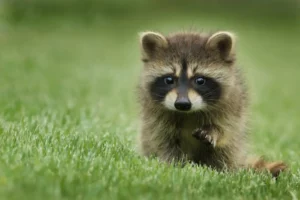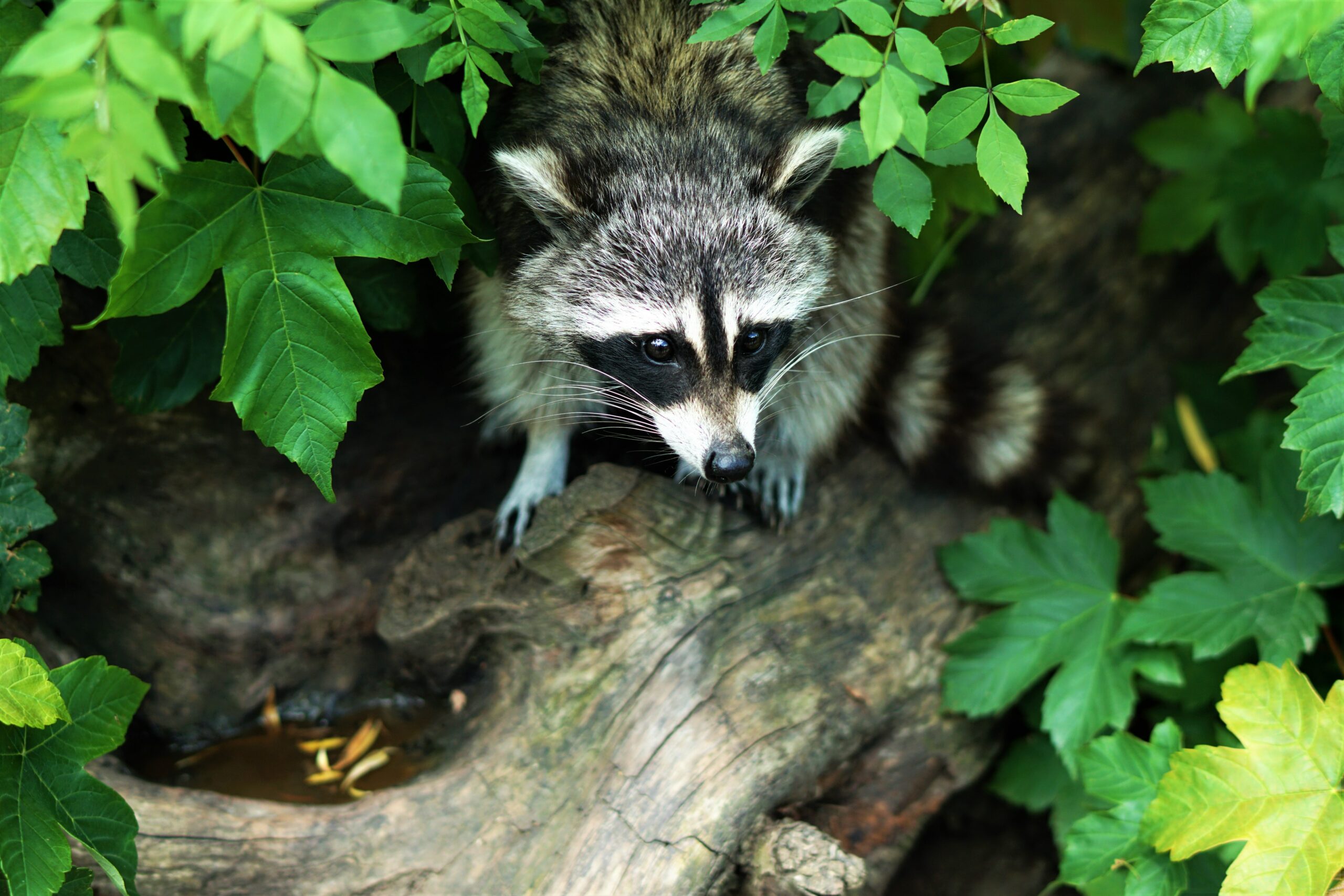Ah, the curious case of raccoons and kittens. A topic that might raise your eyebrows in surprise or concern. Step into the peculiar world of raccoon diet – are felines on their dinner plate?
You might have heard tales or rumors, perhaps even seen some questionable signs in your own backyard. However, is there any truth in this? Do the masked bandits of the animal kingdom actually consume kittens?
Now, you need to understand that raccoons are opportunistic eaters by nature. They can and will eat practically anything they come across.
Their diet is predominantly composed of berries, insects, eggs, and small mammals. Adding to the ambiguity, they are known to snatch away food from your pets’ bowls when left unattended.
This alone might not conclusively end the debate, but it does paint a picture of their dietary behavior. As for kittens specifically, there isn’t a definite answer – yet. The mystery continues as we explore further.

Understanding Racoons’ Basic Nature
Racoons: An Introduction
Do you know what creature lays hidden behind mischief-sparkling eyes, masked by nature, and is gowned in a luscious coat of gradient grays?
Yes, it is none other than your neighborhood raccoon. These nocturnal, ring-tailed mammals have a complex nature. They’re curious, adaptable, and exhibit a broad range of behaviors, making them highly resourceful.
Racoons’ Predatory Traits
Raccoons are omnivores, feasting on a healthy mix of plants, insects, and small animals. They have keen senses and robust physical strength, which enable them to cleverly manipulate their environments, effectively hunting when needed. By no means are they apex predators, yet they have their cunning ways.
Racoons’ Prey Selection
Raccoons aren’t overtly picky eaters, but their food preference does lean towards the easy-to-catch and high on nutrition types. In a rural setting, their diet leans towards mammals and birds, including eggs and carrion. In an urban context, they lean more towards human leftovers, pet food, and easily available small prey.
Racoons’ Behavioral Traits
Incredibly adaptive, raccoons thrive in both urban and rural environments. They are predominantly solitary animals but may at times form loose groups, often associated more with the availability and proximity of food rather than social bonds. They typically shy away from humans but can become bolder when continually exposed to them.
Raccoon-Kitten Interactions
Factors That Initiate Interactions
Generally, encounters between raccoons and kittens spawn out of curiosity, territorial disputes, or food-driven incentives. While raccoons aren’t usually a direct threat, hunger, and desperate circumstances may alter this dynamic.
Frequency of Raccoon-Kitten Encounters
The encounters depend on the household’s proximity to raccoons, the creature’s feeding patterns, and the pets’ accessibility. Broadly, the frequency of these interactions doesn’t happen too often, but the possibility yet resides.
Potential Outcomes of Encounters
Interactions between raccoons and kittens, though rare, can lead to three potential outcomes. They could be a harmonious coexistence, evoked curiosity in one another, or, under dire circumstances, the raccoon viewing the kitten as potential prey.

Looking into Case Studies
Reports of Racoons Attacking Kittens
Unfortunately, there have been grievous instances where raccoons have reportedly attacked kittens. This isn’t a typical behavior but under certain conditions, a raccoon might pose a threat to a small, inexperienced, or vulnerable kitten.
Reports Where Racoons Ignored Kittens
Contrarily, there are numerous instances where raccoons have shown complete indifference towards kittens. This is more common, with raccoons more interested in scoring a quick meal from the cat’s food dish than the kitten itself.
Discrepancies and Their Reasons
The reason behind these contrasting behaviors is essentially individual circumstances, influenced by factors such as the raccoon’s hunger level, the kitten’s size and demeanor, and the availability of other food sources to the raccoon.
Analyzing Racoons’ Potential Threats to Kittens
Raccoons as Physical Threats
In direct encounters, a raccoon, with its superior size and strength, may pose a physical threat to a kitten. Especially a kitten that is yet to develop its full physical capabilities.
Raccoons as Disease Vectors
Raccoons can carry diseases like rabies, raccoon roundworm, or lepto. While transmission risk is relatively low, any interaction between a raccoon and a kitten poses some risk.
Raccoons’ Impact on Kitten’s Behavior
The presence of raccoons can evoke stress-induced behavioral changes in kittens. These could include defensiveness, fearfulness, or aggression, altering the kitten’s development and temperament.

Kittens’ Potential as Racoons’ Prey
Size and Age Considerations
Raccoons are opportunistic hunters. Thus, kittens, particularly newborn or very young ones, could potentially be seen as prey owing to their smaller size and lack of defensive capabilities.
Kitten’s Defense Mechanisms
However, kittens aren’t defenseless. They have sharp claws, teeth, and natural predatory instincts. As they mature, they learn to hiss and puff up their fur to appear more intimidating.
Health and Vulnerability Factors
A weaker, ill, or injured kitten could be more susceptible to a raccoon attack compared to a healthy one. The kitten’s vulnerability often matters more than its size or age.
Raccoons and Domestic Cats: A Comparative Analysis
Dominance Hierarchies
In direct confrontations, raccoons can be dominant over cats due to sheer physical power. Yet, domestic cats working together or even a single, large, experienced feline could stand its ground.
Territorial Behaviour
Raccoons and cats can both be territorial. While domestic cats primarily defend their perceived territory, raccoons might contest for food or shelter, leading to clashes.
Inter-species Aggression
Inter-species aggression generally stays low. Raccoons usually disregard cats unless provoked, hungry, or feeling threatened. Cats, on the other hand, tend to distance themselves from raccoons.
Preventive Measures for Reducing Risks to Kittens
Setting Physical Boundaries
Creating a safe physical environment for your kitten is paramount. This could be a fenced area, a secured home entrance, or exclusive play zones which are out of a raccoon’s reach.
Deterring Raccoons
Deterring raccoons involves limiting food access, employing repellents, and sealing potential shelter places. Importantly, it includes not encouraging their presence by feeding them intentionally.
Resources on Safety and Protection
Several resources, like animal-friendly organizations and pet-owner forums, provide detailed information and strategies that can ensure your kitten’s safety and well-being.
Influence of Habitat on Raccoon-Kitten Interactions
Urban versus Rural Settings
Urban settings typically accentuate raccoon-kitten interactions due to close living quarters. Here, raccoons are accustomed to humans and less afraid of probing homes for food. In contrast, rural areas offer extensive space, keeping raccoons farther from households.
Availability of Food Source
The interaction level generally increases if a reliable food source, like an open garbage can or pet food left outside, is present, attracting more raccoons closer to your home.
Familiarity with Territory
When raccoons repeatedly visit the same area, they get familiar with the surroundings, including the inhabitants. This familiarity can sometimes lessen their fear of the unknown, promoting closer encounters.
Possible Interventions in Case of Raccoon-Kitten Interactions
Human Intervention
If you witness an adverse raccoon-kitten interaction, consider employing safe, non-contact deterrents. For instance, loud noises or bright light can drive a raccoon away.
Other Animals’ Intervention
In some cases, other animals might intervene in such interactions. However, this has a risk of escalating the situation, leading to significant physical harm.
Interventions Through Adaptations
The long-term solution is building adaptations for both the cat and the backyard. This ensures the kitten’s safety without causing harm to the raccoon, maintaining the balance.
Are Chickens and Kittens Equally Vulnerable to Raccoon Predation?
When it comes to raccoons and chickens: a comprehensive understanding is essential to protect these vulnerable animals. While both chickens and kittens are potential victims of raccoon predation, chickens are more likely to be targeted due to their size and limited mobility. Implementing proper precautions, such as secure coops and vigilant monitoring, can help safeguard against raccoon attacks on these defenseless creatures.
Ethics and Legal Implications of Raccoons Eating Kittens
Legal Implications
Depending on local wildlife laws, there may be strict restrictions against harming or relocating raccoons, making it vital to resort to non-harmful deterrent methods.
Ethical Dilemmas
The ethical quandary here revolves around preserving the well-being of both creatures. Both have their roles to play in their ecosystem, and it’s our responsibility as humans to respect that.
Role of Animal Control Authorities
Animal control authorities can provide essential guidance and help in handling such situations. They operate following laws and have the necessary expertise to manage the predicament without harming any party involved.
To encapsulate, while raccoons and kittens might live side by side, their interactions can vary significantly. The question, “Will raccoons eat kittens?” can’t be answered with a simple yes or no. It depends on numerous factors, all unique to individual circumstances. Yet, understanding the basics of their nature and behavior can aid us in mitigating risks and ensuring the safety of all creatures involved.











